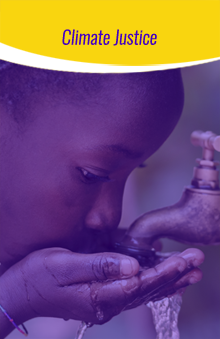Climate change is the long-term shifts in temperatures and weather patterns. These shifts may be natural, such as through variations in the solar cycle.
Climate justice acknowledges climate change has differing social, economic, public health, and other adverse impacts on underprivileged populations.
KAWAC as an advocate of climate justice is striving to have these inequities addressed head-on through long-term mitigation and adaptation strategies.
Many victims of climate change also have disproportionately low responsibility for causing the emissions responsible for climate change in the first place – particularly youth or people of any age living in developing countries that produce fewer emissions per capita than is the case in the major polluting countries.
Importance of Climate Justice
Climate justice is an aspiration, a movement and a human right. It is not being afraid that every time it rains your home will flood, and being able to stay cool on extremely hot days. It is being able to afford “real” clean energy to power your households, public transportation, schools and senior living facilities. It is stopping the expansion of extractive industries, re-imagining solutions that benefit everyone and learning to value traditional scientific prediction models and mechanisms.
It is preparing communities for the worst and ensuring easy, barrier-free access to relief and support to aid in the recovery after a climate disaster. It is realizing that the toll on mental health is just as damaging as the levelling of a home in a storm, and accounting for that in the costs and solutions necessary to repair people’s lives.
It is acknowledging the destruction we have caused and showing our forgiveness to Mother Earth with our actions. It is sharing an understanding that black and brown people have suffered disproportionately from historic, systemic/institutional racism and environmental injustices that have made certain communities more vulnerable than others by no fault of their own. I long for the day when low-income, black, Indigenous and people of colour do not suffer disproportionately from the irresponsible stewardship that we all contribute to.
Ways to adapt climate change
- Acknowledging the harm
- Demanding accountability
- Addressing racism, power and privilege
- Prioritizing equity
- Transforming systems.


